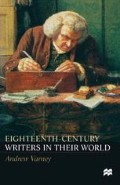Abstract
Cambridge, London, Goslar, Paris, Orleans. Wordsworth knew about cities. His ‘Lines Composed a Few Miles above Tintern Abbey’ (1798) are not just a celebration of the ‘beauteous forms’ of the natural landscape; they are a resumption of a long negotiation, one of the major preoccupations of the eighteenth century, between constructions of urban and rural life. In the ‘Lines’ the site of this negotiation is not so much the viewpoint above Tintern as the mind harassed and weary in the city:
Preview
Unable to display preview. Download preview PDF.
Notes
Samuel Johnson, The History of Rasselas, Prince of Abyssinia, ed. J. P. Hardy ( London: Oxford University Press, 1968 ) Chapter 12.
George Farquhar, The Beaux Stratagem ed. A. Norman Jeffares (Edinburgh: Oliver and Boyd, 1972) Act 1.1.
Alexander Pope, The Poems of Alexander Pope, ed. John Butt (Bungay: Methuen, 1968 ) p. 243.
A. R. Humphreys, The Augustan World: Society, Thought and Letters in Eighteenth-Century England (London: Methuen, 1954; repr. New York: Harper, 1963 ) p. 24.
Henry Fielding, The History of Tom Jones ed. A. R. Humphreys, 2 vols (London and New York: Dent, 1962) 1.8–9.
James Thomson, The Seasons ed. James Sambrook (Oxford: Clarendon Press, 1981) ‘Spring’ ll. 768–9.
David Nokes, Raillery and Rage: A Study of Eighteenth-Century Satire ( Brighton: Harvester Press, 1987 ) p. 41.
J. Paul Hunter, see Before Novels: The Cultural Contexts of Eighteenth-Century English Fiction (New York and London: Norton, 1990) Chapter 6, esp. pp. 141–56, quotation on p. 142.
The paradox of a developing sensibility that inheres only in an ever-diminishing circle of sympathetic minds is explored in John Mullan, Sentiment and Sociability: The Language of Feeling in the Eighteenth Century ( Oxford: Clarendon Press, 1988 ).
Virginia C. Kenny, The Country-House Ethos in English Literature, 1688–1750: Themes of Personal Retreat and National Expansion ( Brighton: Harvester Press, 1984 ) p. 210.
Maynard Mack, The Garden and the City: Retirement and Politics in the Later Poetry of Pope, 1731–1743 ( Toronto: University of Toronto Press, 1969 ) p. 3.
W B. Carnochan, Confinement and Flight: An Essay on English Literature of the Eighteenth Century ( Berkeley, Los Angeles and London: University of California Press, 1977 ) pp. 173–8.
The Flight from History in Mid-Century Poetry’ (1982), in Leopold Damrosch (ed.), Modern Essays on Eighteenth-Century Literature (New York and Oxford: Oxford University Press, 1988) pp. 422, 424.
James Boswell, Life of Johnson ed. G. Birkbeck Hill, rev. L. F. Powell (Oxford, 1934) 1.127.
Samuel Johnson, Poems ed. E. L. McAdam, with George Milne (New Haven and London: Yale University Press, 1964) ‘London’ 20, 19.
John Hardy, ‘Johnson’s “London”: the Country versus the City’, in Studies in the Eighteenth Century, ed. R. E Brissenden ( Canberra: Australian National University Press, 1968 ) p. 252.
Donald Greene, ‘Introduction’ to Paul Alkon and Robert Folkenflik, Samuel Johnson: Pictures and Words (Los Angeles: William Clark Andrews Memorial Library, 1984) p. iv.
Pat Rogers, Samuel Johnson (Oxford: Oxford University Press, 1993) p. 98.
Cf. Fielding’s comment that there would be ‘no office so dull’ as that of the travel writer who has nothing but ‘the difference of hills, valleys, rivers’ to write about, in A Journey from this World to the Next and The Journal of a Voyage to Lisbon ed. I. A. Bell and Andrew Varney ( Oxford: Oxford University Press, 1997 ) p. 123.
Copyright information
© 1999 Andrew Varney
About this chapter
Cite this chapter
Varney, A. (1999). Country and City, the Choice of Life: Dr Johnson. In: Eighteenth-Century Writers in their World. Palgrave, London. https://doi.org/10.1007/978-1-349-27763-6_8
Download citation
DOI: https://doi.org/10.1007/978-1-349-27763-6_8
Publisher Name: Palgrave, London
Print ISBN: 978-0-333-67973-9
Online ISBN: 978-1-349-27763-6
eBook Packages: Palgrave Social & Cultural Studies CollectionSocial Sciences (R0)

